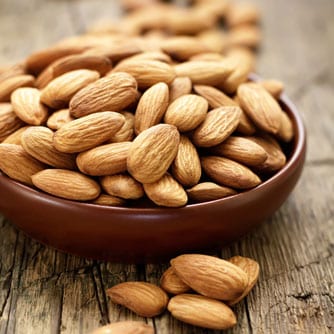Prebiotics are compounds that help to promote “good bacteria” (probiotics) in the gastrointestinal tract, with which a wide variety of beneficial health effects are associated. Zhibin Liu, from Fuzhou University (China), and colleagues enrolled 48 healthy men and women, ages 18 to 22 years, in a study in which the participants either: received 56 grams of roasted almonds added daily to their diet; added 10 grams of almond skins daily to their diet; or consumed 8 grams per day of fructooligosaccharides (control group). After six weeks, the data revealed that the almonds and almond skins significantly increased Bifidobacterium spp. and Lactobacillus spp. populations. Among the almond skin group, the enhanced levels of “good bacteria” were sustained for two weeks after the intervention period concluded. Among the roasted almonds group, the beneficial changes were not seen until week six. The study authors conclude that: “Our observations suggest that almond and almond skin ingestion may lead to an improvement in the intestinal microbiota profile and a modification of the intestinal bacterial activities, which would induce the promotion of health beneficial factors and the inhibition of harmful factors. Thus we believe that almonds and almond skins possess potential prebiotic properties.”
Almonds Aid Digestive Health
Zhibin Liu, Xiuchun Lin, Guangwei Huang, Wen Zhang, Pingfan Rao, Li Ni. “Prebiotic effects of almonds and almond skins on intestinal microbiota in healthy adult humans.” Anaerobe, Volume 26, April 2014, Pages 1-6.
RELATED ARTICLES




